The Intermittent Fasting Guide For Beginners is an article was written by Libby Jenkinson, MPS, and reviewed by Raphi Sirtoli, MSC
If you are new here, the Intermittent Fasting Guide For Beginners is perfect and easy to follow.
You will learn how intermittent fasting works. What to eat. What to drink. What does each intermittent fasting plan look like?
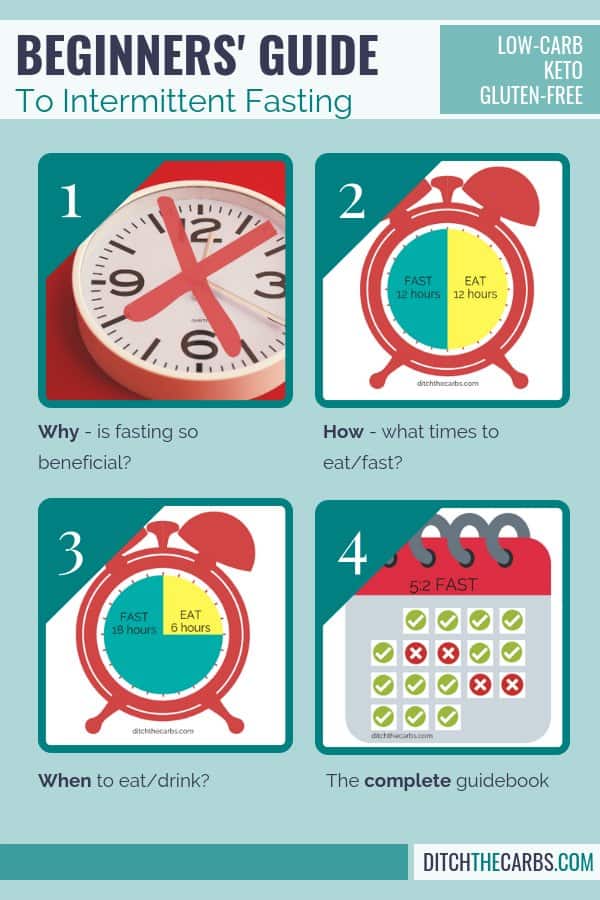
Medical Disclaimer -Before embarking on any change in diet, lifestyle or activity, you may need to be under the supervision and care of your primary healthcare provider. This article should not be construed as medical advice, nor should it be substituted for medical advice from your healthcare provider. By continuing to read this article, you assume all responsibilities and risks for instituting lifestyle management.
Are you ready to lose weight and heal your body for life (without dieting, drugs, or making yourself miserable)?

Our free on-demand video training will walk you through how to make this THE year you set health goals…and keep them.
Intermittent Fasting Guide For Beginners
Some people find fasting helps them lose weight quickly and even helps relieve the mental stresses of always trying to figure out what to cook and eat.
If you’ve been contemplating if this option is right for you, here is a basic beginner’s guide to intermittent fasting full of useful information!
Is Intermittent Fasting A Fad?

Intermittent fasting isn’t a new concept, in fact, people have been intermittent fasting for thousands of years, but it’s a topic that has been picking up a lot of popularity throughout the course of the last few years.
The benefits of fasting have been recorded and studied for decades, yet fasting has gained popularity so rapidly in recent years that many websites, authors, and bloggers have jumped on the fasting bandwagon, so it appears to be a fad to the untrained eye.
The problem with it now being called a fad is that the medical profession is hesitant to prescribe it for their patients because they have a habit of dismissing fads on principal.
But studies have continued to show that intermittent fasting when done correctly, can have varying effects on your body, weight, your metabolic health, and reduction of metabolic biomarkers associated with some chronic diseases.
Why Is Fasting So Beneficial?

When intermittent fasting is done correctly, with guidance and with not too extreme measures, fasting is extremely beneficial.
It has been shown to:
- reduce oxidative stress
- improve metabolic biomarkers seen in chronic diseases (1)
- improves mental function
- reduces chronic inflammation (2)
- improved quality of life indicators
- improved insulin sensitivity
- improves beta-cell function
- improves hypertension
- reduced cravings
- improved cardiometabolic health
- can improve health, even in the absence of weight loss
6 Ways To Fast
Before diving into options surrounding the fasting periods, it’s first important to understand exactly what it is. Intermittent fasting is basically just as the words sound: varying times of when you eat and when you don’t.
There are many opinions on what you should or should not be eating between fasting periods. You should be enjoying nutrient-dense, lower carb, unprocessed food from whole food sources, NOT a diet of burgers, fries, candy, and soda on your “days off”.
Make every meal count – make every meal pack a nutritional punch!
There are many different varying methods for intermittent fasting, but here are a few of the more popular ones that people tend to gravitate towards:
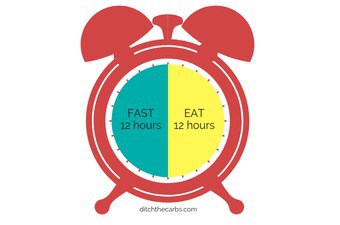
Fasting for 12 hours a day
This intermittent fasting method is pretty straightforward and simple. Many people who are just starting out tend to like this option because the fasting portion can occur during times of sleeping as well. Fasting overnight is a great way to knock out a large chunk of the fasting time, leaving very few “awake” hours to not eat.
An example of a 12 hour fast is fasting between the hours of 7 pm – 7 am. So your cut-off for eating is 7 pm, no more evening snacks.
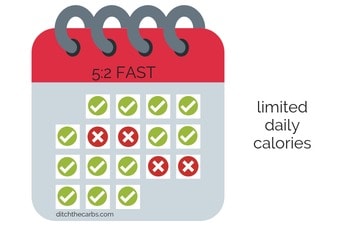
5:2 Intermittent Fasting
On this fasting plan, you eat low-carb for 5 days out of the week, but for the other 2 days, you limit yourself to a) 500-600 calories OR b) extremely limited carbs. It’s up to you to monitor your caloric intake and how to spend them.
Some prefer to have the fasting days back to back, such as Monday and Tuesday, while others prefer to space the days during the week such as Monday and Thursday. But ultimately, it needs to work in with your lifestyle and your schedule.
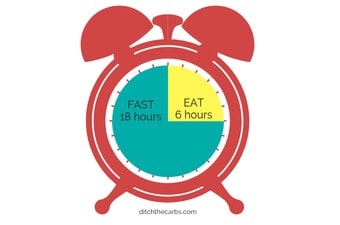
18:6 Intermittent Fasting
This fasting plan is becoming more commonplace. You fast for 18 hours each day, and eat within a 6-hour “window”. The reason it has become so popular is that you gain the benefits of fasting, but in reality, you are simply skipping breakfast and stopping all late-night snacks.
Practically, this may look like this. An eating period of 1 pm-7 pm, and fasting outside of these hours.
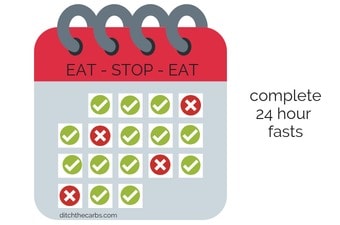
Eat – Stop Eating – Eat
In the fasting world, this is one that many people would probably need to work up to. It literally is a pattern of fasting for a 24 hour period, once or twice per week.
Working up to this choice would be a good option as it can be more difficult in the beginning to do.
OMAD (one meal a day)
As the name suggests, this is simply enjoying one meal each day. It is generally accepted this meal should be as nutrient-dense as possible and based on low-carb healthy fat principles.
Extended Fasting
This is not for the faint-hearted nor for those just starting out. Some people like to experiment with an extended fast such as 3 days or 1 week. The longest studied fasting period is 382 days (see reference below). Extended fasting is not recommended for long periods of time and without medical supervision.
What can you eat/drink?

Believe it or not, there are a few things that you can consume even when fasting! Yay!
- Clear liquids (you want to make certain that you are staying hydrated)
- Cold/hot tea (no sugar added)
- Black coffee (no creamer, sugar, half n half, milk, etc. – just black)
- Other non-caloric beverages free of added sugars, etc.
But you have to make fasting work for you. If you cannot give up your morning tea or coffee with milk, try the smallest amount that you can still enjoy your morning cuppa. Drinking only water is the gold standard, but find what works for you and you still get results.
Can fasting help you lose weight?
While it’s not a guaranteed weight loss plan, intermittent fasting is well known to kick-start weight loss, especially if the scales have stopped moving.
For the most part, weight loss is being accomplished by a dramatic decrease in their caloric daily intake. It is also due to a reduction in glucose and insulin levels which enables you to be in nutritional ketosis. Your body has switched to fat-burning mode.
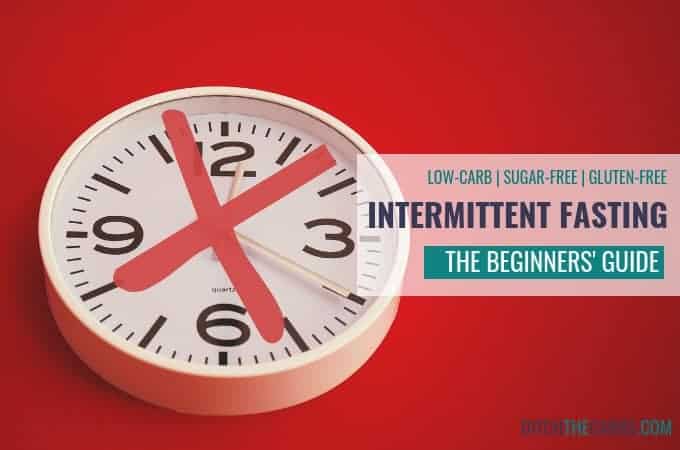
Conclusion
You have to be the one to find the balance between what works with you and your body.
If you dramatically lower your calories during your fasting days but then eat a ton of calories, sugar, carbs, and junk food during your regular eating days, you may find that you aren’t losing any weight because of your food choices.
This beginners’ guide to intermittent fasting can be a great resource in figuring out how to start. It’s always a good idea to ask questions to your doctor or physician as well to get their medical expert opinion and advice. You will find that once you start on your intermittent fasting, it will become easier over time!
References:
- (1) Beyond weight loss: a review of the therapeutic uses of very-low-carbohydrate (ketogenic) diets
- (2) The ketone metabolite β hydroxybutyrate blocks NLRP3 inflammasome-mediated inflammatory disease.
- Intermittent fasting: The science of going without
- Features of a successful fast of 382 days’ duration
- Intermittent fasting: A surprise update
- Metabolic effects of intermittent fasting
- Intermittent Fasting And Metabolic Health, NCBI.
- Early time-restricted feeding improves insulin sensitivity, blood pressure, and oxidative stress even without weight loss in men with pre-diabetes
What if you could actually take control of
your health in just 10 days?
It’s not your fault you can’t lose weight as a woman over 40 even though you’ve likely tried literally everything. Your metabolism probably feels broken and your hormones are likely all out of whack.
But you can fix it all with ONE simple change: eliminate sugar. We make it super easy with daily lessons teaching you the science behind what makes us gain weight in our midlife and beyond! Are you ready to get started now?


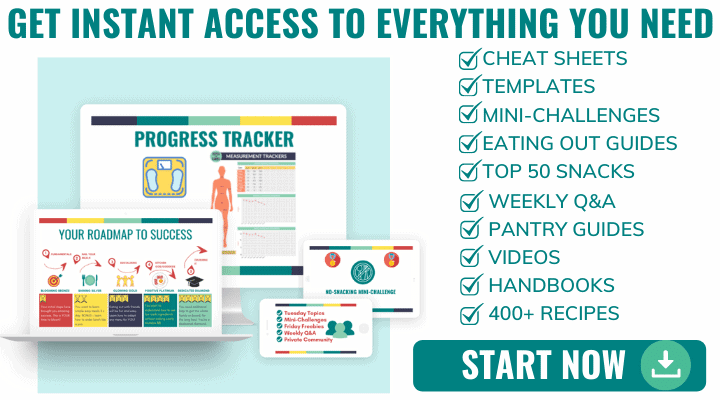
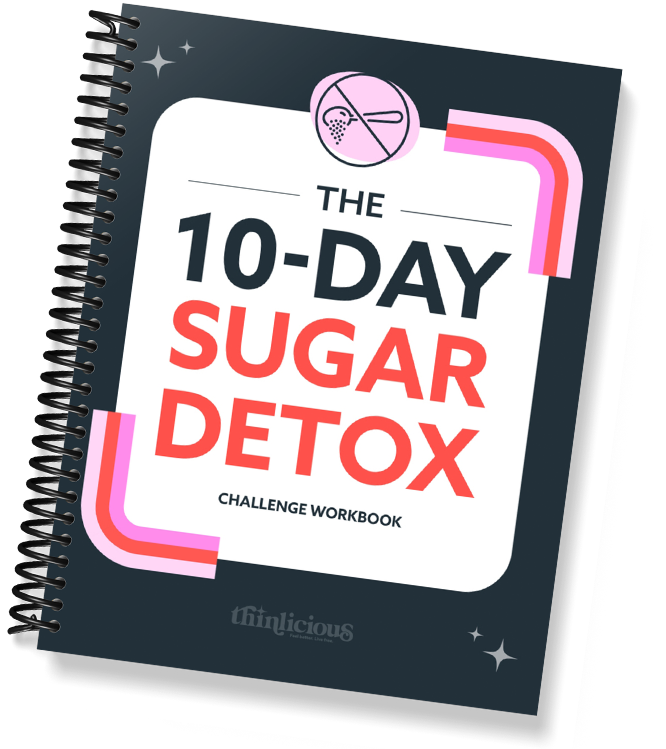






I do the 18/6 schedule! I’ve never been much of a breakfast person so I break my fast every day at 12 and by 6 my eating window is over. I also fast for 24 hours after a cheat day! IF has definitely been great for me and now it’s a natural thing for me to do
I have just started fasting in the same window, I am curious.. do you fast every day or do you go so many days then off so many days? If you go off what are your eating goals on those days? Thanks!
The things I’ve experienced when doing intermittent fasting are improved mental function, beta cell function, and cardiometabolic health. The others you listed do improve but not as much as the ones I mentioned. That’s based on my experience though. Thanks for sharing as well.
You claimed that weight loss is caused by a dramatic reduction in calories. That’s not necessarily true, and am surprised you spouted that 1980’s mentality here. Wise up.
Agreed, dramatic reduction in calories is not what IF is all about.
“Clear liquids” — it’s best not to use anything that contains sweeteners or flavorings during your fasting periods, not even lemon in your water. There are legit studies that show “tasting” things can provoke an insulin response in your body, which defeats the purpose of fasting in the first place. Best to enjoy those items in your eating window, of course, if you choose. As an IF’er for over a year, I’ve heard many stories from people who say “fasting doesn’t work,” but then come to find out they were drinking flavored water or flavored teas all day long. ??♀️
This is great info! I’ve been looking for articles on how to intermittent fast and so glad I came across this as it’s really helpful. My twin sister just signed up with [blocked website] to help her get through the rough spots and looks like she is enjoying herself so far not to mention she already lost 3 kilos since she started over a week ago! I’m thinking of giving it a go as well. Any recommendations?
If you need additional help, why not come and join us inside Ditch The Carbs PRO, I will teach you everything you need to know to live low-carb and sugar-free PLUS the FAMOUS mini-challenges that stop you from falling back into old habits. Join us here … for less than the cost of your weekly coffee and muffin (and I’ll teach you how to stop those too).
Excellent article. I certainly love this website. Keep it
up!
Good idea is a sparkling water that lowers blood sugar and aids metabolism. I drink it when fasting and when not.